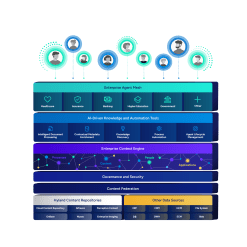Summary
Artificial intelligence (AI) is transforming businesses by enhancing efficiency, customer experiences and workforce capabilities.
AI's impact on business
- Efficiency and innovation: AI automates repetitive tasks, optimizes processes like supply chain management and customer service, and drives innovation through generative solutions that uncover novel insights.
- Customer and user experiences: AI personalizes customer interactions in retail and e-commerce through recommendation engines. In healthcare, it aids diagnostics and treatment. In manufacturing, AI's predictive capabilities reduce downtime and optimize production.
- Workforce empowerment: AI fosters skills development in new fields like data science and AI engineering. It also augments human capabilities, allowing employees to focus on creative and critical thinking tasks.
- Future-proofing with machine learning (ML): Combining AI with ML enables predictive analytics for informed decision-making and continuous improvement through self-learning algorithms.
- Access to information: AI organizes and analyzes vast amounts of data, streamlining content management and providing data-driven insights into consumer behavior and market trends.
In this article, we delve into five major benefits of AI that are making a better tomorrow possible for businesses, big or small. Explore how this remarkable technology is helping organizations enhance the ways they work and engage with their customers, employees and content.

AI unlocks efficiency and innovation
AI enhances efficiency and innovation profoundly, revolutionizing how businesses operate and how individuals interact with technology. By automating repetitive tasks and augmenting human capabilities, AI frees up valuable time and resources. This enables organizations to let their human talents focus on strategic initiatives and creative problem-solving.
Process automation and optimization
A notable area where AI excels is in automating and improving processes that were previously time-consuming and susceptible to human error. Combined with robotic process automation (RPA), AI streamlines workflows and identifies bottlenecks through intelligent algorithms and data-driven insights to enhance productivity.
AI's versatility makes it a powerhouse for enhancing operational efficiency in various business functions, including:
- Supply chain management: AI predicts demand and optimizes inventory levels, reducing the risk of excess or insufficient stock.
- Customer service: With AI-powered chatbots, businesses can provide round-the-clock support to their customers, increasing customer satisfaction and reducing wait times.
- Human resources: AI streamlines the hiring process by analyzing candidate data, identifying top talents and shortlisting candidates for interviews.
- Procurement: AI analyzes data to identify cost-saving opportunities and optimize supplier selection, negotiation and contract management processes.
- Logistics: AI's predictive capabilities help businesses optimize routes, reducing delivery times and costs.
> Learn more: How RPA and AI drive end-to-end intelligent process automation
Innovation and problem-solving
The benefits of AI technology extend beyond automating processes. It also drives innovation through generative solutions that leverage vast datasets to uncover novel insights and possibilities that may be hidden from human cognition. What you see is no longer what you get — as AI can help you see and gain much more.
In fields such as pharmaceutical drug discovery and materials science, AI algorithms can analyze complex molecular structures that may take years for a human person to study, identifying promising areas for further research from the sea of prospects. This greatly accelerates the pace of innovation and solution discovery.
AI creates better customer and user experiences
Today's customers expect personalized and seamless experiences from businesses, no matter the industry. AI plays a vital role in meeting these expectations by analyzing vast amounts of data to anticipate customer preferences and provide recommendations accordingly, enhancing satisfaction and loyalty.
AI can also tailor user interfaces based on customer behavior and activities, leading to improved engagement. By giving users something familiar and what they prefer, AI can foster greater interactions and help businesses better meet user expectations.
AI transforms: 64% of leaders report their organization has significantly or completely transformed its content management approach because of AI
Forrester Consulting’s survey of 400+ ECM decision-makers (commissioned by Hyland) found AI’s availability is driving vital imperatives like innovation and experience improvements.
“These goals are now more attainable than ever before as artificial intelligence (AI) introduces novel ways to derive value from enterprise content and unstructured data,” the report says.
Additionally, decision-makers believe strong content intelligence capabilities lead to benefits including an improved ability to boost data quality, accelerate decision-making and deliver superior employee and customer experiences.
Read the full studyHere are a few ways AI is transforming customer and user experiences across industries:
Retail and e-commerce
One industry where AI is making a significant impact is retail and e-commerce. Online retailers like Amazon leverage AI-powered recommendation engines to suggest products based on past purchases, browsing history and demographic information, resulting in higher conversion rates and increased customer engagement.
In an era dominated by online commercial activities and interactions, this trend extends to nearly all customer-facing businesses in both private and public sectors.
Healthcare
AI is also transforming healthcare by enabling timely diagnostics and personalized treatment strategies. Through advanced enterprise imaging techniques and pattern recognition algorithms, AI can support doctors in identifying anomalies in medical images with a level of accuracy and efficiency unmatched by human eyes, leading to early detection and improved patient outcomes.
This not only helps with early detection but can also help prevent medical staff burnout as AI can assist in managing clinical workloads. On the treatment side, AI can help analyze patient information from both structured and unstructured data to help healthcare providers tailor and coordinate personalized care plans, further optimizing clinical workflows.
Manufacturing
AI's predictive capabilities help manufacturers reduce downtime and increase productivity. With the help of AI-powered systems that gather data from sensors, machines can detect anomalies in their performance and trigger maintenance before a breakdown occurs. This helps minimize production losses, saving businesses time and money.
Moreover, by analyzing data from various sources, AI can also identify areas for process improvement and optimize production schedules.
> Learn more | The role of AI in transforming higher education

Subscribe to The Shift
Hyland’s monthly newsletter helps you elevate your content management strategy
Offering unparalleled insights into the AI and cloud technologies transforming what content can do, The Shift gives you actionable strategies from industry thought leaders. Learn from real-world success stories and innovative perspectives that will keep your organization at the forefront of ECM transformation.
Subscribe to stay ahead, stay informed and make your enterprise content an even more strategic asset.
AI develops and empowers your workforce
No matter the industry, the proliferation of AI technologies is reshaping the workforce landscape, creating new opportunities and demands for specialized skills. In today's knowledge economy, individuals with AI proficiency now have a competitive edge in the job market and greater potential for career advancement. In fact, 73% of decision-makers in Forrester’s study believe improving skills is critical to leveraging AI for content intelligence effectively.
AI proficiency is like a key that unlocks doors to new opportunities. As AI supports employees by taking over mundane and repetitive tasks, this can not only improve job satisfaction but also allow employees to focus on tasks that require critical thinking and creativity.
Skills development
AI is driving the need for upskilling and reskilling, creating job opportunities. This is especially true in new fields such as data science and AI engineering, where AI expertise is essential for extracting actionable insights from complex datasets and developing predictive models that drive business decisions.
As organizations increasingly rely on data-driven strategies, the demand for skilled data scientists, AI engineers and anyone with AI knowledge continues to grow. By investing in AI training and education, businesses can help their employees develop the skills needed to thrive in this new era of technology.
Fostering creativity and critical thinking
AI is not here to replace humans but rather to augment their capabilities. By taking over mundane tasks, employees can focus on more creative and innovative work. This allows for a culture of experimentation and knowledge sharing where new ideas can be tested without the risk of disrupting business operations to drive growth and progress.
By providing employees with access to AI tools and training programs, companies can empower their workforce to explore new ideas, experiment with emerging technologies and encourage meaningful change.
Future-proofing your business with ML and AI
AI’s ability to promote collaboration and innovation is compounded when it is paired with machine learning (ML) technology. ML plays a pivotal role in powering AI algorithms' capabilities, enabling predictive analytics and facilitating continuous improvement. By combining ML and AI businesses can enhance the capabilities of both technologies to make better decisions and improve outcomes.
Predictive analytics
ML enhances the predictive capabilities of AI by enabling it to analyze vast amounts of data in real time, identifying patterns and trends that can help businesses plan for the future. Instead of relying on guesswork or loose estimates, organizations can use predictive analytics to inform their decision-making and stay ahead of market shifts.
For example, in marketing, ML can support AI in analyzing customer data to identify patterns and predict purchase behavior, allowing businesses to create personalized offers and campaigns that resonate with the target audience. This not only improves the customer experience but also increases sales and brand loyalty.
Continuous improvement
With ML, AI can learn from past experiences and improve over time, making it a valuable asset for businesses in any industry. By analyzing data from various sources, AI can identify areas for improvement and recommend changes to business processes and strategies.
Through the iterative process of training algorithms on large datasets, ML helps AI identify patterns and make predictions with increasing accuracy over time. This self-learning capability enables organizations to adapt and improve continuously, future-proofing their business for ever-changing market demands.
AI enables quick access to accurate information
In an age where market conditions and customer behaviors are constantly changing, having quick access to accurate information is essential for businesses to stay competitive. AI enables organizations to do just that by organizing and making sense of vast amounts of data, enabling businesses to find relevant information and uncover useful insights quickly and efficiently.
Content management
AI can extract and analyze data from various sources, such as social media, customer feedback, and sales numbers. With AI, finding information from a sea of data is no longer as time-consuming and laborious as searching for a needle in a haystack.
For example, in content management systems, AI-powered algorithms can automatically categorize and tag digital assets, making them easily searchable and accessible to users. Whether it's images, documents or multimedia files, AI streamlines content management processes in the enterprise and enhances collaboration across teams.
This ensures accurate information can be retrieved quickly, saving costs while enabling stronger security, better decisions and boosting efficiency.
> Learn more | How ECM systems fortify digital security
Data-driven insights
AI-driven analytics tools can also provide valuable insights into consumer behavior and market trends, empowering businesses to make data-driven decisions and stay ahead of the competition. AI can also help with data visualization, making complex information easily understandable and actionable for employees at all levels of an organization.
By leveraging AI to analyze customer feedback, social media sentiment and competitor strategies, organizations can identify potential risks and opportunities, allowing for proactive decision-making and minimizing the impact of market changes.
Allow the benefits of AI to power your business
As we step into the age of AI, capabilities that organizations once only hoped for are now at our fingertips. From automating processes and driving innovation to enhancing customer experiences and empowering employees, AI is a powerful tool that can transform businesses in any industry.
Explore the capabilities of AI solutions with Hyland and see the difference it can make for your organization. Connect with a Hyland representative today to start your AI journey.
You might also like:

What’s the difference between artificial intelligence and machine learning?
The terms "artificial intelligence" and "machine learning" are often used interchangeably. Here are key differences between the two technologies transforming modern businesses.

Artificial intelligence (AI) and data capture: An evolution of efficiency
From Siri and Alexa to customer service chatbots, artificial intelligence (AI) has fundamentally changed many aspects of the way we work — and data capture is no exception.

Unveiling AI’s role in document processing and data extraction
Discover how AI-powered document processing works, as well as its benefits, applications and future potential.

The 2025 process automation guide: Setting the right priorities
The use of AI in process automation will disrupt workplaces — just make sure your organization is leading.










